I Am From … History!
If you want to understand a historical text, you need to understand not only the time period it depicts but the time at which the text itself was written. A story about the Vietnam War told in 1968 (The Green Berets) will differ from one told in 1978 (Go Tell the Spartans) or 1987 (Full Metal Jacket) or 2002 (We Were Soldiers). The events of the war itself haven’t changed, but the tone with which the authors approach it does.
This change of tone happens because (to quote Orwell once more) who controls the past controls the future. The past is a lens through which we evaluate ourselves and our choices. We give the events of the past higher esteem because they’re a complete tableau. We can look back on them and see a beginning, middle and end. In coming from historical events, and not mere fiction, we take them as “real.” The lessons of history, therefore, are lessons taught by reality. We ignore the past at our own peril.
There’s a Santayana quote I don’t feel doomed to repeat here; you see what I’m getting at.
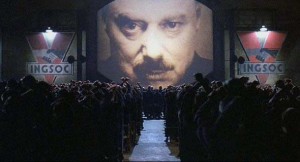
Westeros is at war with the Targaryens; Westeros has ALWAYS been at war with the Targaryens.
Between 2005 and 2011 we have a wealth of period dramas which examine historical eras through the lens of Blood, Tits and Scowling. Our stories of the American West come to us through John Wayne and Audie Murphy films. Our stories of the Roman Empire, the Tudor dynasty and Prohibition come to us from history class. Why would we want to return to these well-trod eras after so long? The past hasn’t changed. What’s the new angle?
The Birth of Tragedy
In 1872, shortly before Al Swearingen opened the Gem, Friedrich Nietzsche wrote The Birth of Tragedy From the Spirit of Music, a philosophical theory of art and drama. Nietzsche wanted to explore why the Greeks, still considered by many the founders of civilization, had developed the unique form of tragedy that they had.
Understanding Nietzsche’s argument requires that you understand his theory of the Apollonian and the Dionysian. Most people translate the Apollonian as “order” and the Dionysian as “chaos,” and that’s a good enough rubric for our purposes. The Apollonian aesthetic is a world dominated by forms, precision and beauty (realistic murals or sculptures of athletes), while the Dionysian aesthetic is a world dominated by formlessness and sensation (music or drunken orgies).
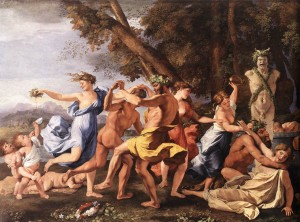
We're going streaking! WOOO!
The Greeks, as founders of civilization (and even if they weren’t, that’s what scholars thought of them as in the 1870s), invented many of the tools and forms that enabled ancient humans to master nature. From them we get cartography, coinage, plumbing, gears, central heating and the gimbal. We also credit them with the formal methods of reasoning and rhetoric as laid down by Socrates and Aristotle. The Greeks made sense of the world around them, using reason to triumph over nature.
And yet the Greeks were surrounded by pagan cultures and the thousand religious cults of Mediterranean civilization. These cults made use of music, wild festivals and (possibly) psychotropic drugs. The abandonment that resulted was part of their religious and social experience, just as the sculpted columns and fine murals of Greek temples were a part of theirs.
(Again, I’m recounting Greek civilization as understood by Nietzsche and his contemporaries, not Greek civilization as it may have been)
Nietzsche describes Greek tragedy, particularly the plays of Aeschylus and Sophocles, as the synthesis of Apollonian and Dionysian aesthetics. A hero tries to make sense of the world, but is ultimately overcome by fate. Oedipus investigates the murder of the last king of Thebes, only to find that he himself is the murderer and that he’s been sleeping with his mother. Agamemnon tries to avoid angering the gods as he returns from Troy, only to be punished for sacrificing his daughter Iphigenia ten years earlier. The protagonist tries to make sense of the world and fails; the chorus, in turn, makes sense of the protagonist’s failure. The Apollonian and the Dionysian weave together in a constant cycle.
The metaphysical consolation, which as I have already indicated, true tragedy leaves us, that at the bottom of everything, in spite of all the transformations in phenomena, life is indestructibly power and delightful, this consolation appears in lively clarity as the chorus of satyrs, the chorus of natural beings, who live, as it were, behind civilization, who cannot disappear, and who, in spite of all the changes in generations and a people’s history, always remain the same. With this chorus, the profound Greek, capable of the most delicate and the most severe suffering, consoled himself, the man who looked around with a daring gaze in the middle of the terrifying destructive instincts of so-called world history and equally into the cruelty of nature […]. Art saves him, and through art life saves him.
– Friedrich Nietzsche, The Birth of Tragedy from the Spirit of Music
The Weight of Experience
One last point to recall about Greek tragedy: the periods depicted in Oedipus Rex and the Oresteia were just as ancient and fantastic to the Greeks as the periods depicted in Rome, The Tudors and Game of Thrones are to us. We may lump them all together as being part of the “toga era,” but the myths of the Trojan War were distant legends to Aeschylus and his audience.
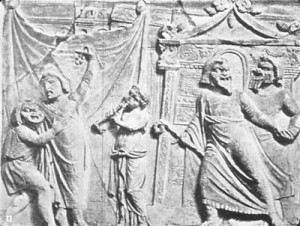
Man, who cares about this Agamemnon jerkoff anyway?
Why did Aeschylus set his best and most beloved plays in an era that was ancient even to the ancient Greeks? Because (as mentioned above) the weight of history lends credibility to a story. It means that the moral of the story is not just a casual observation, but a lesson that thunders down the centuries. His contemporary plays, like The Persians, were meant to cheer on the Greek state. His tragedies were meant for something else.
And what do Greek tragedies tell us? They blend together the interplay of Apollonian and Dionysian aesthetics. A figure of legend – Oedipus, King of Thebes; Agamemnon, patriarch of the house of Atreus – attempts to put off the fate that the universe has in store for him. He creates Apollonian forms: proper obedience to protocol, the weight of ritual. But Dionysian sensation catches up to him. He surrenders to or is overcome by impulse: gouging his eyes out in horror, or falling victim to his wife’s rage. The survivors comment on his downfall, thereby lending form once more to a formless chaos. And so the cycle continues.
There Are No Men Like Me. There’s Only Me
The genre of Blood, Tits and Scowling blends the Apollonian and the Dionysian just as well as, if not better than, Greek tragedy. It depicts selfish men of power, scheming to build empires. Then it shows the impulses of sex and violence that lead their best-laid plans awry. Neither Nucky Thompson, Al Swearengen or Robert Baratheon can build a world that blood and tits can’t overturn. But neither can blood and tits survive for long in Bacchanalian innocence without someone scowling in the background.
The most famous examples of this genre all take place in historical epochs: Renaissance England, the decline of the Roman Republic, the Wild West, the Roaring Twenties or fantastic empires such as Camelot or Westeros. There are a few contemporary examples, such as True Blood or The Sopranos. But the former takes place in a world of dark urban fantasy that we can’t identify with. And the latter takes place in a world which America has so mythologized – the world of organized crime – that it might as well be set in Kings Landing, NJ.
(That’d be a show, eh? Robert Baratheon as an aging capo, Ned Stark as his reluctant lieutenant, Varys and Littlefinger as his scheming enforcers. The rival families drawing in at the scent of blood)
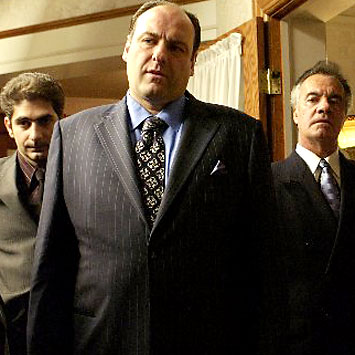
I charge you to bring justice to the false knight, Big Pussy, and all those who shared in his crimes. I denounce him and attaint him. I strip him of all ranks and titles, of all lands and holdings, and sentence him to death.
Why are there so few Blood, Tits and Scowling shows about contemporary men of power? Why isn’t the upcoming Kennedys mini-series (starring Greg Kinnear, Katie Holmes, Barry Pepper and Tom Wilkinson) about Jack Kennedy the philanderer and Lyndon Johnson the bloodthirsty warmonger? Why are there miniseries depicting John Adams as a crotchety patriot, but none depicting Ben Franklin as a schemer and sex fiend? Because these figures of legend are too recent and too prominent for Americans to revisit. The current American “story,” if you will, is too tied up in the classroom notions of these men.
But Henry VIII? That’s like, what, five centuries ago? Who cares what we say about him?
If you want to say that a historical figure was a skirt-chaser, a murderer or a conspirator, you either need substantial proof or you need to wait until even his descendants’ scholars are dead. Better yet, pick someone obscure. Boardwalk Empire depicts the corruption and degeneracy of Nucky Thompson, treasurer for Atlantic City in the 1920s. It doesn’t depict the corruption, xenophobia and callousness of Woodrow Wilson, President only a few years earlier. Deadwood takes on Wild West figures no one has heard of, like Al Swearengen. And Game of Thrones is about a continent full of people who never existed!
Picking targets that no one will complain about gives you license to revel in the Blood, Tits and Scowling that the genre demands. You can portray your heroes as anti-heroes: cunning masters of their circumstances, manipulating their peers into position. You can also play up the baser instincts that led to their downfall: the violence, the sex and the commingling of the two. Say that Ronald Reagan was a cunning manipulator and you’ll get legions of conservative protesters falling on your head. Say the same thing of the young Octavian, though, and who will care?
So the Blood, Tits and Scowling genre requires an era that’s either historically distant (Rome, Deadwood, The Tudors, Boardwalk Empire) or so fantastic that it might as well be another world (Game of Thrones, Camelot, Spartacus). It cannot be grappled with in the present era, just as the Greeks of antiquity couldn’t depict tragedies with contemporary figures.
But there’s one question left unanswered: why now? Why has this genre emerged – or re-emerged – on premium cable in the 21st century? Why not ten years from now, or ten years earlier? Why do producers find a need to tell us tales of historical figures behaving badly? And why do audiences keep eating it up?
I leave this question as an exercise for the comments thread, partly because I don’t have an answer myself. Greek tragedies emerged from a period when Greece was emerging from the rule of a tyrant and under threat from the Persian armies. It’s possible that this blend of domestic unrest and foreign paranoia left many Greeks wondering if their Apollonian forms could sustain the buffets of Dionysian fate.
But I’m just guessing. What do you think? Why has the Blood, Tits and Scowling genre emerged in this century? And what does it portend for the future?
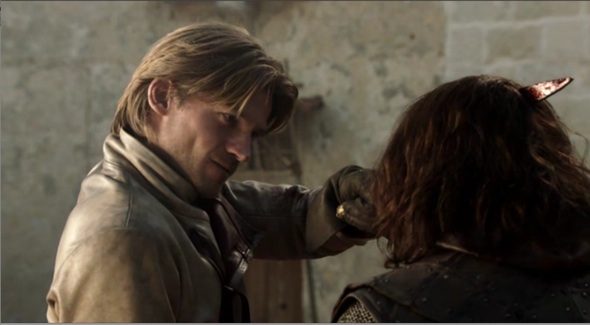
Well, I suppose we should get the obvious out of the way — Human beings have always loved stories about blood, tits, and scowling.
I think there are at least two trends going on right now that influence the popularity of historical/fantastic drama. One is medium, both production and delivery medium. We have the ability now to produce the historical and fantasy television shows that we history buffs and fantasy geeks have dreamed of producing. CGI has enabled us to produce special effects that were out of the question twenty years ago, and the success of the LOTR and Marvel super-hero films means that historical/fantastical big-budget production will actually be financed and attract talented actors, writers, and FX geeks. We have an unprecedented opportunity to do what we want, and we’re doing it.
We are also able to distribute this media more effectively. The target audience can access it through television, but also through streaming media. I hope I am correct in asserting that I am demographically the target audience — 35, professional, female, grew up on LOTR and MST3K. I just wish HBO would get it’s rear in gear and give me access through Netflix or Amazon; HBO Go is too expensive for someone who doesn’t use cable for anything but internet access. Even to watch Game of Thrones. It’ll be streaming somewhere soon.
I think the second trend is the traditional fin-de-siecle retrospective and apocalyptic art influence. The naughties are over, but the trend to look back into the past as well as the nagging sense that *something is ending* has influenced the art we’ve produced. Into our second decade, apocalyptic pronouncements have less power, but the apocalyptic events around us keep our anxieties alive. We’re thinking about the past because we’re anxious about the future.
As Americans, we’ve heard the comparisons to the fall of the Roman empire — so we’re exploring empires. What does it look like when things are rotten in the state of (insert empire here)? Who survives? Who thrives? Do we get the satisfaction of seeing the schemers get their comeuppance, or are we doomed to suffer their machinations? Will the Dionysian slaves revolt, or the Apollonian rulers succeed in their oppression? Will the Apollonian rulers be undone by their Dionysian texting? Will they be undone before they bring about the end of the world?
Either that, or geek aesthetic is chic.
Question answered, in full. Technology allows for better looking period pieces, and it feels nice to know that we’re not the only generation obsessed with sex, violence, and conspiracy.
Let know man put asunder tits, the proper attire for scowling and bleeding.
I have never loved this site as much as when I read that Achewood reference. This is a brilliant article on a very interesting topic, too, so that helps.
“We can do you blood and tits without the scowling, or tits and scowling without the blood, or we can do you all three concurrent or consecutive. But we can’t give you blood and scowling without the tits. Tits are compulsory.”
“They’re all tits, y’see.”
This article is on the cutting edge of 1973.
Seriously, it’s just cable TV catching up to long-ago trends in cinema towards realism.
The only truly emergent trend is higher production values in cable serial shows due to larger budgets. So the Blood, Tits, and Scowling are set into larger scenery, with more well funded costume departments, more careful cinematography, and higher film quality (or digital).
BZZZT! Sorry! This article is on the cutting edge of 1969 (q.v. The Wild Bunch). 1973 is, like, so four years ago. Or four years later. Whichever.
Awesome post. I do think, however, that people are interested in historical stuff because it’s a way of “learning” while getting entertainment. Historical fiction is a huge and hugely profitable publishing genre. And I also wonder if the focus on tits and blood (especially tits) is a nice escape from our day-to-day: we’re enmeshed in all of the cultural rules (no shirts, no shoes, no service and much, much more) and seeing people from long ago or far away (or both) have more tits and more blood (and even more scheming) is an exciting escapist fantasy.
CGI, more money, advanced communication technology could just as easily lead to an explosion in interesting space opera and speculative science fiction or documentaries/pure educational programs or some crazy giant world-wide sing along/sporting VR gaming events as to historical and fantasy drama, why does history enter at all if “it’s just money and tech?”
I think people are painfully aware of how our technology and assembly line method of production has changed our way of viewing ourselves and our relations to human being- that it’s not opening up the endless possibilities we thought it would. So how do we learn what changed or what, if anything, we’ve lost if we don’t go back to a time without endless mechanical production optimizing everything as the dominate way of being in the world?
Can’t say I’ve liked the BTS shows I’ve seen so far, so I’m not jumping at the others.
Just wondering where Mad Men sits in this, it certainly skirts T and S, but not a lot of blood, but occurs to me as lounging in the back of the room if not sitting down in a prominent chair…
I think RachelT had pretty good reasoning. The only thing I can add would be that the focus of media, fiction or historical fiction moves in idiosyncratic fashions. Why are we getting superhero films? Why are we getting reality TV? There’s business reasons; such as a major network getting a hit and the other networks scramble to replicate a similar response in order to attack the same part of the audience or the audience’s mass psyche, and then there are more subtle reasons. The interests of people in the 21st century are fickle, unpredictable and often unreliable. You need something particular to grab them and to capture their imaginations. A kind of ‘construction’ that elaborates on history or family, but is not an alien construction. Rome, Boardwalk Empire, Borgias, Game of Thrones all have certain things certain segments of audiences latch onto; for some its the fights, for others its jokes about blowjobs, literary and historical scholars get to meditate on the art as a reflection of reality or ideas and for TVtropes addicted viewers there’s a plentiful amount of magnificent bastards. The success of one’s show depends on how efficiently and effectively you do all this.
Another aspect to include with BT&S is the language. All of these shows that I’ve seen include quite a bit of swearing, often using words that didn’t even exist in the given historical period (maybe even taking into account translation, since English also shouldn’t exist in many of them). Is the foul language another Dionysian representation to go along with the blood and tits? And is the more widespread use of such language important to the genre or just inevitable given that these shows are mostly on premium channels and that’s what is expected, to further differentiate from regular cable and the broadcast networks?
I listened to a lecture about ancient Greek Dionysian tragedy/comedy festivals, apparently Dionysus symbol was the phallus and the highest honor they could offer was the comedians making tons of dick jokes and funny dick songs. So there’s that, I don’t know if it includes all swearing or if dick was even a swear to them.
Blood and tits you are right on about. Everyone loves blood and tits. But you’ve got the wrong ‘S’: what you are looking for is sovereignty. We are fascinated by the self-determining individual, and we fantasize about being him. Being sovereign is the ultimate in individualism: there is no higher power to constrain the sovereign. A sovereign makes his own rules.
(How can you tell a sovereign? A sovereign has the power of life and death over those in his power — thus: blood. And since women love power, usually: tits.)
This answers your question about why so few recent settings: nobody is sovereign any more. In modern politics sovereignty is held by everyone, and thus no-one. Reagan? He had some power, but he certainly could not have personally summarily executed someone. Tony Soprano is the exception that proves the rule.
Incidentally, there are several sorts of modern semi- or crypto- sovereign figures that we do love quite a bit. The soldier, particularly in battle. The superhero. Neo. Even the slasher villian. Yeah: we make movies about that. And you know what? These guys do spend a lot of time scowling.
So the definition of sovereign- someone who purposely kills people? I’m reading your comment that way because you propose the soldier is sovereign particularity in battle, but to me the soldier is under the strictest hierarchy humanly possible, and any death under his hand is not of his wanton digression and accountable to no one. When American soldiers kill people in Iraq who weren’t ordered to be killed it’s a huge freak’n deal and those soldiers get arrested and court-martiald.
So if it’s true that personal sovereignty to the point of killing who don’t like isn’t possible in the modern era, that means there’s nothing else to be learned from these blood, tits, and scowling stories that is applicable to real life? Therefore it’s 100% wish fulfillment? It’s possible, but is it really about literally killing people, that it’s all about *wanting* to go back to an all against all nasty brutish and short world, with lots of tits?
The definition of sovereignty has nothing to do with killing. But a sovereign does have the power to kill with impunity. This is just as true for a absolute monarch as it is for the giant committee-meeting that is democracy. The difference is, personal sovereignty is interesting — it is a single person making heavy decisions. It happens fast, and you don’t have to telegraph the result. Not only do committees attenuate responsibility to everyone and no-one, they are also extremely boring to watch operate. The possible outcomes are usually very limited and known in advance. (Would you rather watch an hour of C-SPAN or an episode of Rome?)
No, a soldier is not sovereign. But he does have awesome personal power relative to your everyday person: he gets to kill. Similarly, Batman, Rambo, Pinhead, and Neo are not kings. But they are superhuman, and hence have far more autonomy than most people.
There is plenty to be learned from BTS stories. They feature realistic enough characters with human emotions, which is why we care about them. They are full of dominance and submission, trust and betrayal, heroism and cowardice.
Blood/Tits/Scowling has the makings of a superbly simple RPG system: three defining character attributes, each on a standardized numeric scale, making up the core potential of each participant in a given historical/dramatic setting.
Need to seduce your way out of a tricky situation? That high Tits score means you’ve got a good chance.
Bloody but guileless soldier confronted by allegations? Good thing you’re carrying that Scowl-boosting “Blackmail” item.
Critical hits and critical misses become the stuff of epic plot twists, David deposing Goliath in bed or on the field or in court to the gasps and laughs of the assembled players.
It could be done as a card game, with a collection of historical characters for the given setting as well as a series of scenario cards to describe each playthrough’s narrative an atom at a time, and prop cards to add some extra flavor to the unfolding of things. The marriage of known character/plot/setting elements to chance in narrative structure and in the showings of the dice means that every game of “Game of Thrones: The Game” is different; friends will breathlessly recall the round when, through a string of stunning card turns and die rolls, Cersei managed to maintain unwilling chastity and honesty while Brienne bedded and married an unchallenged King Stannis.
Fanfic as generative card game narrative.
Better yet, with a generalized system kept standard across ostensibly discrete editions, avid remixers and slashfickers could shuffle up fantasy crossovers. Tyrion Lannister beds Carmela Soprano! The Knight of Flowers marries, and subsequently beheads, Thomas Cromwell! Steve Buscemi’s Tony Blundetto gets into a fistfight with Steve Buscemi’s Nucky Thompson!
Oblique Strategies meets HBO meets the d6.
It does sound like the sort of thing you’d find in a KoL game, or possibly in an MSPaint Adventure…
I’ve had this same thought. If anything comes of it, I’ll keep you posted.
Hey nice post..i liked your way to explore your knowledge
I’d propose an alternative title to capture the same idea a bit more generically – “Blood, bits, and scheming” :)
I prefer “Scowling” just because it’s a concrete visual reference. Everyone knows what a scowl looks like.